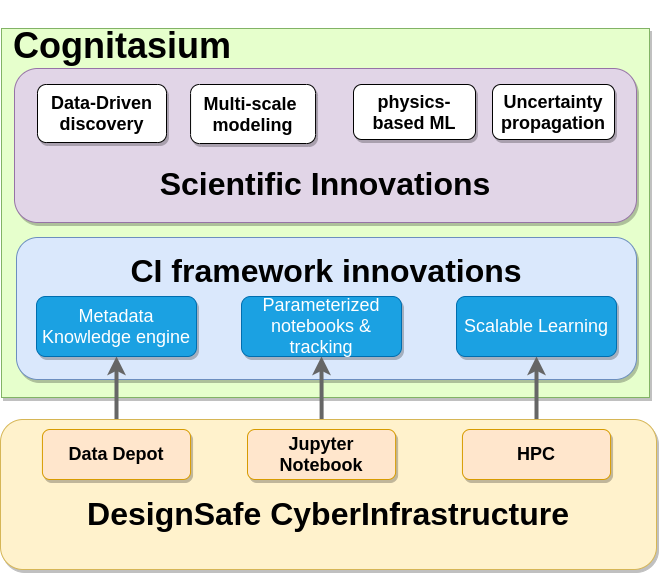Published on: 15 May 2021
NSF OAC awards Dr Krishna Kumar, Dr Rathje, and Dr Gaffney an NSF Elements grant to improve data-driven discoveries in natural hazard engineering.

Numerical modeling plays a critical role in assessing and mitigating risks posed by natural hazards, such as the risks to coastal communities from hurricanes and the threats to infrastructure from earthquakes. Accurately predicting these hazards requires modeling the multi-scale nature of these problems, covering a range of physical scales from microscopic to kilometer-scale interactions. Traditional approaches often focus on a particular scale and are incapable of predicting the risks accurately. With the advent of community data repositories such as the DesignSafe CyberInfrastructure, there is an as-yet untapped opportunity to effectively use these large datasets to develop new data-driven models to solve multi-scale problems. Furthermore, assessing the risks of natural hazards involves a complex web of interconnected analyses, which leads to difficulties in tracking the various uncertainties driving the final decision. Tracking the modeling workflow can ensure decision processes are informed and transparent and can help decision-makers define their confidence in model results. To support these needs, new methods are required to automate the workflow tracking and help researchers find and effectively utilize the large datasets in community repositories to develop new theories. Cognitasium, an Artificial Intelligence (AI)-powered cyberinfrastructure, addresses these challenges by automatically extracting the hazard analysis workflows, augmenting large community datasets with relevant information for analysis, and enabling AI models to discover new theories from massive datasets. Cognitasium is being developed as an open-source framework and can be easily adapted to a variety of communities. The project uncovers the possibility of discovering new theories by combining field and experimental data with numerical simulations in large community datasets. The automated tracking of workflows improves the research reproducibility and transparency in risk assessment. The project will transform static data repositories into an active community of users and developers working together to develop new theories. With sustainable software practices and open science strategy, it will support a large community of users beyond natural hazard engineering. The software and tools from the project are generalizable to other fields with massive data requirements and the need for multi-scale models and reduced uncertainties (e.g., physics and health sciences). The project incorporates four specific educational objectives: Inspire future scientists through Code@TACC aimed at enabling high-school students to program, mentor and train undergraduate researchers, facilitate the retention of underrepresented minorities through workshops and training offered at the National Society of Black Engineers and underrepresented colleges, and dissemination through documentation, webinars, and summer institutes.
Uncertainties surrounding the modeling process can have important implications for the decision-making process in Natural Hazard Engineering (NHE). Assessing the risks of natural hazards is a complex process involving numerical simulations, integrated field and lab characterization, and uncertainty quantification. The complex web of inter-connected analysis leads to an inability to track workflows and accurately propagate the associated uncertainties, thus impacting the decision-making process. Meanwhile, the emergence of interactive tools such as Jupyter Notebooks has transformed data analysis and exploration. However, the interactive nature of Jupyter has further exasperated the ability to track workflows. Hence, there is an urgent need for automatically extracting workflows to incorporate a data-driven approach to quantify and reduce uncertainty and improve the decision-making process. Cognitasium is a novel machine-learning-powered CI framework for data-driven discoveries in NHE. Cognitasium will become a fundamental component of the NSF-funded DesignSafe CyberInfrastructure offering benefits to a broad community of NHE researchers. The project will: (i) enable end-to-end integration of uncertainty propagation in agile environments through workflow tracking in parameterized Jupyter notebooks, (ii) build knowledge graphs that integrate experimental and field data with numerical analysis to develop new multi-scale models, and (iii) support scalable machine learning to solve complex multi-scale problems with large datasets. The AI framework will improve natural hazard analysis and mitigation of hurricanes, storm surge, and earthquakes through data-driven discoveries. The data-driven CI framework will be generalizable to other fields with massive data and the need for multi-scale models and reduced uncertainties.